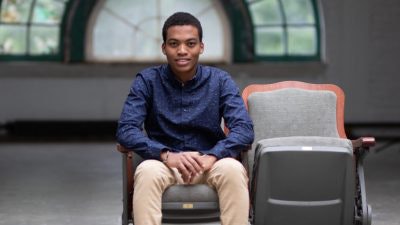While political protests and street violence in Haiti spread almost as rapidly as the pandemic, shutting down schools and businesses in the summer of 2020, Ted Jacquet’s 15-year-old sister, Traci Lara, puzzled over her math textbooks, trying to finish high school.
Jacquet, who grew up in the Haitian city of Pétion-Ville, was in the U.S. that summer, preparing for his third undergraduate year at Earlham College, a Quaker school located in Richmond, Indiana. His sister would often call him from Haiti for homework help in another “peyi lok,” or Haitian Creole for lockdown. Like many young people, she was missing school weeks at a time because of political instabilities.
 Earlham College student Ted Jacquet
Earlham College student Ted Jacquet“When she didn’t understand a math topic or something like that, I’d try to explain it so that she could stay caught up in school for her exams,” said Jacquet, whose sister was about to take one of two important national tests to be able to go to college. If she failed that exam, she would need to wait another year to retake it.
“My sister is also very brilliant, so she’d find articles online to teach herself. But she lost almost two months of school,” said Jacquet, whose sister is considering studying medicine at university.
While wealthy families could pay for tutors to help students in lockdowns, low-income students could not afford such resources. Dr. Fabienne Doucet, an associate professor of early childhood and urban education at New York University, noted this problem has been ongoing. She has researched Haiti’s school systems and why educational reform has stalled.
“Since 2019 and 2020, with instability and fear, kids getting an education is just a challenge. It’s far more of a challenge than it should be,” said Doucet. “And yet education is extremely important to Haitians. They value it so highly and see it as the way that their children can get out of poverty to have a better future.”
While helping his sister, Jacquet came up with an idea. He noticed that most online lessons were not in the students’ native languages of French or Haitian Creole. That made learning remotely even harder. And the resources were audio or text files rather than videos, which may engage more students.
“I started thinking that I wanted to make online lessons free for students to use when they can’t go to school,” said Jacquet, who called his idea EdLight. “Students in poor families are impacted most by these lockdowns. Their education continues to be interrupted.”
With the support of Earlham College’s Center for Social Justice, Jacquet received a $10,000 grant from the Davis Projects for Peace to bring EdLight to life. Davis Projects funds grassroots projects led by undergraduates at colleges and universities across the nation.
Thanks to the funding, Jacquet is working this summer with Haitian teachers to create video lessons on STEM subjects in French and Haitian Creole. The modules are designed to prepare high schoolers for their national exams.
EdLight has partnered with Haiti’s National Ministry of Education and the digital educational platform Lekol, which will host the videos. On Lekol, about 10,000 students at 80 partnering schools will be able to access lessons.
Another partnership with Haiti’s leading telecommunication company, Digicel, will allow students to log onto Lekol even if they do not have internet data, only a cell connection. EdLight will also give 100 high school students 100 solar powered banks to charge their devices (i.e. smartphones, tablets) to watch lessons.
“Ted’s project attends carefully to historically marginalized people, and he’s doing real work that will reach real students. It’s exciting,” said Dr. Ahmed Khanani, co-director of the Center for Social Justice at Earlham. “We can’t change 400 or 600 years of historical injustices in one fell swoop, but this project shows how we can do little things that are significant.”
Erlanda Dessources, a 17-year-old high school student in Pétion-Ville, Haiti, agrees. She was not able to go to school this past month because of political turmoil, which the recent assassination of Haiti’s president, Jovenel Moïse, exacerbated.
“Right now, we have something with EdLight to prepare ourselves academically when we’re at home without school. It is a big opportunity,” said Dessources.
To Jacquet, EdLight is just getting started.
“With more people aware of the educational situation in Haiti, we can have more people willing to help,” he said. “And with more people willing to help, we can have a bigger impact. That’s my broader interest.”
Rebecca Kelliher can be reached at [email protected]



















